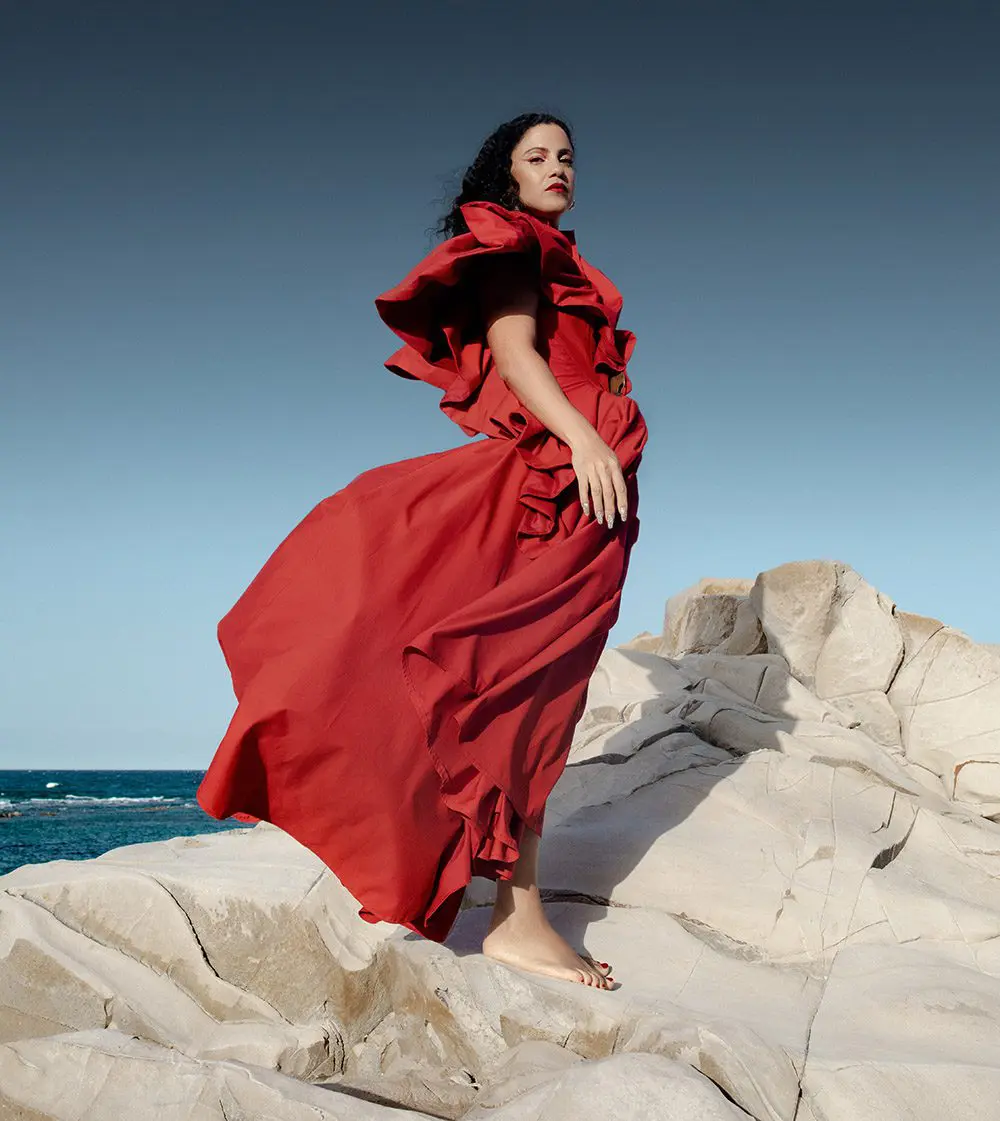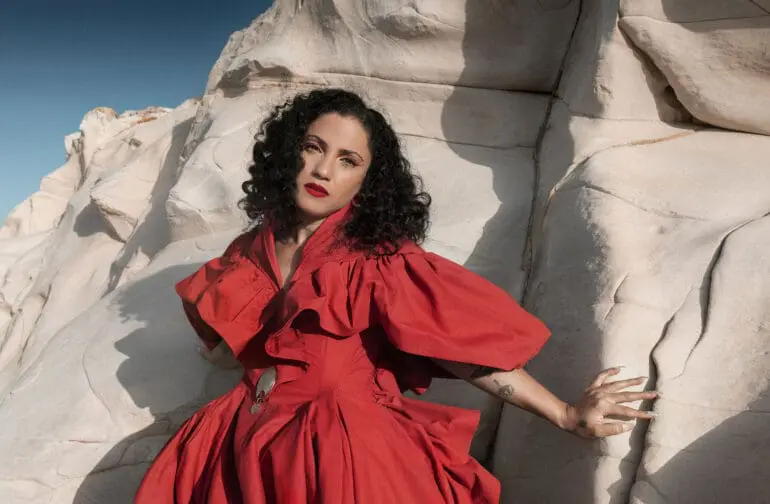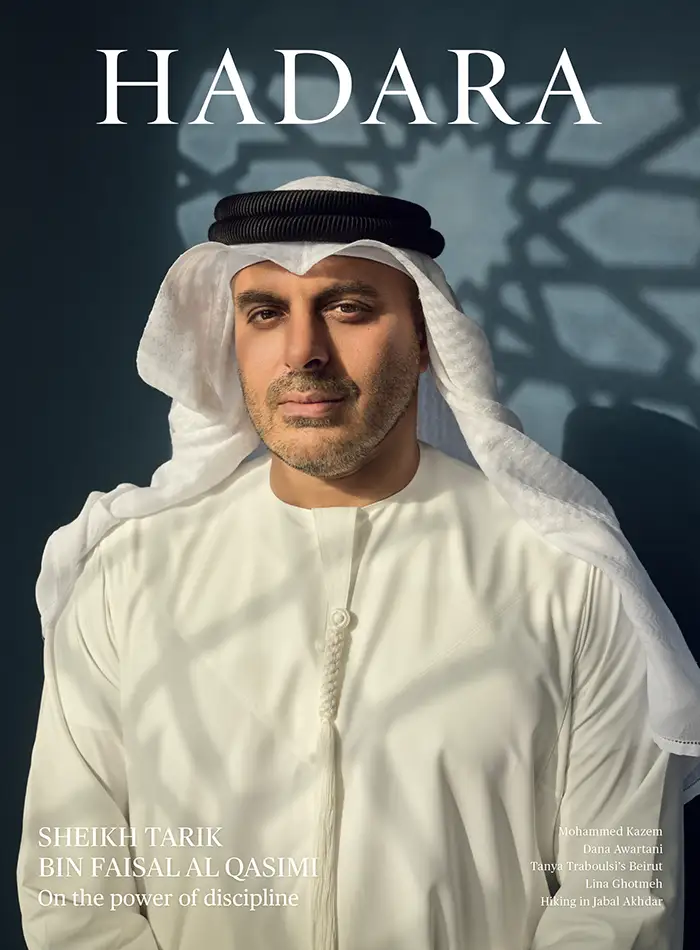
MUSIC
The Artivist
Tunisian singer Emel Mathlouthi puts music to work in her journey from rebellious metal band member to revolutionary and role model.
BY ANNA SEAMAN
PHOTOGRAPH BY RYAN MURAD
Labels are something singer Emel Mathlouthi has tried to avoid—but not always successfully. Activist. Revolutionary. Protest singer. Role model.
Born in the suburbs of Tunis and raised during the long rule of President Zine El Abidine Ben Ali, it is lore that Mathlouthi rose to prominence with a powerful song that became the soundtrack to Tunisia’s Jasmine Revolution, which ignited a fire that spread along the North African shore. ‘Kelmti Horra’ (‘My Word is Free’), based on lyrics by Tunisian poet Amine Al Ghozzi, changed Mathlouthi’s career.
“I remember it vividly. I had a melody in my head, I tried the lyrics and it worked perfectly—it was magic. It doesn’t always happen like that. In fact, it rarely does,” Mathlouthi says.
She performed the song for the first time in Place de la Bastille in Paris in 2008 and after that, she says, “it took on a life of its own.” A video of the performance reached Tunisia and resonated with protesters who had begun demonstrating against endemic poverty and high unemployment. In the months that followed, whenever Mathlouthi performed live, she was surprised to hear audiences singing along to ‘Kelmti Horra’.
“It entered into the collective consciousness,” she says. “By the time I was called to sing it on the streets, it was important enough in some people’s mind that they needed to hear it.” The calling she refers to happened on January 14, 2011, during a demonstration on Avenue Habib Bourguiba in Tunis, hours before President Ben Ali would flee the country. Encouraged by bystanders, Mathlouthi gave an impromptu, a capella performance of ‘Kelmti Horra’ that a fan recorded on his mobile phone. The video of her emotionally charged performance went viral and her life changed.
To hear Mathlouthi sing is to know her superpower. The timbre of her voice swells to fill chambers in your mind and her sometimes-haunting melodies rise like bubbles to connect to the listener, even without comprehension of the lyrics. Her stage presence is enigmatic. She captivates large audiences, but connects with them too on a personal level, reaching across the stage divide.
“I consider creating music to be a humbling and spiritual act,” she says. “I am always looking for new ways to create, and to do that you have to go beyond yourself. Music is a fantasy world, and when you are working on a song, producing and creating, it takes you to amazing spaces that the real world can’t. While it’s touching to be called a role model and to be contacted by people who are inspired by me, I can’t take that with me during my process, just as I can’t focus on the other labels people have given me.”
Growing up, Mathlouthi often struggled with identity. She was raised in a secular home where her atheist father played classical music and rock songs. She spoke Arabic, French and English. When she started university in Tunis she formed an indie metal band with friends. “When I started singing, that was my home and my band were my family. I felt I had found what I had been looking for as well as my style as a musician. But then I discovered the songs of Joan Baez and Bob Dylan and I realised I wanted to use my music and my voice to support those who didn’t have a voice, to push people to change the world.” It was then that she named herself an “artivist”.
At 25, she moved to France to pursue her “artivist” dream and recorded cover songs from artists like Dylan, Baez, Leonard Cohen and Kurt Cobain. She also wrote her own songs, singing in several languages—French, her native Tunisian Arabic dialect, even Kurdish, singing about the Kurds’ struggle for a homeland.
But it was in Tunisia in 2007, just before she moved to Paris, that she wrote ‘Kelmti Horra’. Her debut album, also called Kelmti Horra, was released in 2012 in the aftermath of the protests. In 2015, Mathlouthi performed the song in Oslo with a full orchestra to celebrate the Tunisian National Dialogue Quartet winning the Nobel Peace Prize. And in 2020, during the Covid-19 lockdown, she produced a collaborative version for which she spliced together contributions from 53 musicians, artists, singers, and actors from 22 nations.
Mathlouthi now lives in New York with her American husband and two children. She released a second album, Ensen, in 2017 which was a departure from her previous style. More experimental, it is a cross-genre record that uses programmed beats, electronic percussion, the gumbri (a string instrument native to North Africa), guitar, cello and piano. Recorded in New York, Stockholm, Reykjavik, the Cevennes mountains of France, Montreuil, and Sousse, among others, the album embraced the many influences on her life.
Her third album, The Tunis Diaries, was recorded in 2020 when, locked down by Covid travel restrictions, she was not able to return to New York following a visit to Tunisia. For this, she went back to her roots in a metaphorical, physical and musical sense. The result is a more stripped-down album that focuses on her as a solo artist playing an acoustic guitar. The album included ‘Holm’ (‘A Dream’), a stirring ballad about the power of imagination.
In the past year, Mathlouthi has performed in Mexico, Istanbul, Algeria, and Paris. In February, she produced the music for a video by Iranian artist Shirin Neshat for a New York exhibition about the plight of female prisoners in Iran. She is working on a new album, too, more upbeat and mainstream than earlier work. To make it, she set herself a challenge: to only work with female producers. “I am angry about how things still are in the music industry, there are very few female producers so I want to do something to change that. In fact, I feel that this project is even more activist than the others.”
Still determined to make change, Mathlouthi now embraces the labels she once rejected. “I don’t care anymore if I am called a political artist—I am proud of trying to make this world a better place. If that is political then so be it. Politics is also about caring, not centring on ourselves but being part of a global community. My parents named me Emel, which means hope. And I am an incarnation of that. I don’t give up, there is always a way, and there is always hope.”
Dress by the Mediterranean label Benma.




